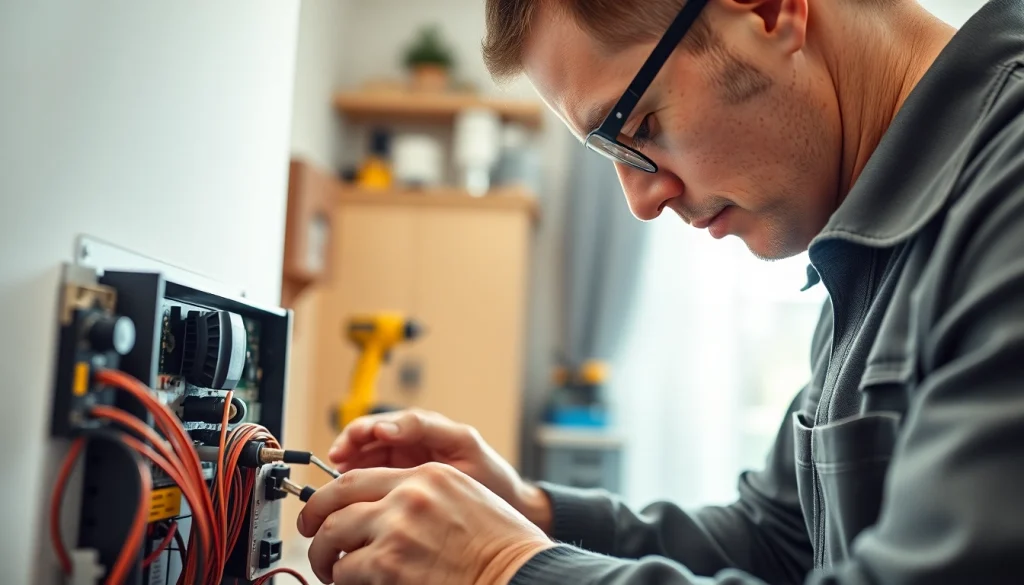Understanding Electrical Repairs
Electrical repairs are a vital aspect of maintaining a safe and functional home environment. These services encompass a wide range of tasks, from fixing faulty wiring to upgrading outdated electrical systems. With increasing reliance on electrical devices in our daily lives, understanding the intricacies of Electrical repairs becomes crucial for homeowners and renters alike.
What Are Electrical Repairs?
Electrical repairs refer to the process of diagnosing, repairing, or replacing malfunctioning electrical components, systems, or wiring in residential or commercial properties. This can include anything from replacing a broken light switch to rewiring entire sections of a building. The goal is to restore proper functionality, ensuring safety and efficiency.
Common Types of Electrical Repairs
- Wiring Repairs: Outdated or damaged wiring can pose significant hazards, such as electrical fires. Repairs may involve fixing exposed wires, replacing old wiring, or upgrading to a new system.
- Outlet and Switch Replacement: Over time, outlets and switches can wear out or become damaged. Replacement ensures they function correctly and safely.
- Circuit Breaker Issues: A malfunctioning circuit breaker can lead to power outages or electrical surges. Repairs may include replacing the breaker or addressing underlying issues.
- Lighting Repairs: Fixtures may fail, or recessed lighting can need upgrades. Repair services can restore lighting functionality or enhance energy efficiency.
- Electrical Panel Upgrades: Older electrical panels may not support modern energy demands. Upgrading panels can improve safety and functionality.
When to Call an Electrician
Knowing when to call a professional is essential for maintaining a safe electrical system. Here are some signs that it may be time to hire an electrician:
- Frequent tripped circuit breakers.
- Flickering lights or dimming when using other appliances.
- Warm or discolored outlets and switches.
- Burning smells or buzzing sounds from electrical fixtures.
- Unusual shocks from appliances or outlets.
Key Safety Considerations During Electrical Repairs
Importance of Safety Gear
Safety should be the foremost concern during any electrical repair. Proper gear includes insulated gloves, safety glasses, and sturdy footwear. This gear not only protects electricians and homeowners but also ensures compliance with safety regulations.
Identifying Electrical Hazards
Understanding potential hazards is critical before initiating any repairs. Common hazards include:
- Exposed wires, which can lead to shocks or fires.
- Overloaded circuits that may overheat.
- Moisture near electrical components, increasing the risk of electrocution.
Safe Practices in Electrical Repairs
To ensure safety during repairs, adhere to these best practices:
- Always turn off power at the circuit breaker before starting.
- Use non-contact voltage testers to ensure circuits are de-energized.
- Keep work areas dry and well-lit.
- Read and follow all manufacturer instructions for tools and components.
DIY vs. Professional Electrical Repairs
When to Consider DIY Repairs
Some minor electrical repairs may be suitable for DIY enthusiasts. Examples of feasible tasks include:
- Replacing outlet covers.
- Changing light bulbs or fixtures.
- Installing simple devices like dimmer switches.
However, homeowners should always evaluate their comfort level and knowledge before tackling electrical work.
Benefits of Hiring a Professional
While DIY repairs can be beneficial for simple tasks, hiring a professional electrician offers numerous advantages:
- Expertise: Electricians have specialized training and experience, making them adept at identifying issues and implementing solutions.
- Safety: Professionals are well-versed in safety protocols, significantly reducing risks associated with electrical repairs.
- Time Efficiency: Experienced electricians can complete repairs faster than an untrained individual, minimizing disruption.
- Long-term Solutions: Professionals can often identify underlying issues that may go unnoticed and provide comprehensive solutions.
Cost Considerations for Electrical Repairs
The cost of electrical repairs can vary based on factors such as:
- The complexity of the job.
- Material costs for parts and equipment.
- Labor rates, which can differ by region.
While it may be tempting to opt for cheaper DIY solutions, remember that professional repairs can save money in the long run by preventing recurring issues.
Tools and Equipment for Electrical Repairs
Essential Tools Every Electrician Needs
Whether you’re a professional or a DIY enthusiast, having the right tools is crucial. Essential tools include:
- Wire Strippers: For removing insulation from electrical wires.
- Multimeter: For measuring voltage, current, and resistance in circuits.
- Insulated Screwdrivers: To avoid electrical shock while tightening or loosening screws.
- Fish Tape: Helpful for routing new wiring through walls.
Safety Equipment for Electrical Repairs
In addition to tools, safety equipment is paramount. Key pieces of safety gear include:
- Insulation Gloves: To protect hands from electrical shocks.
- Safety Goggles: To shield eyes from sparks and debris.
- Hard Hats: For protection from overhead hazards in work environments.
Choosing Quality Tools for Lifespan
Investing in high-quality tools not only improves safety but also enhances efficiency. Look for tools that offer durability, warranty, and positive reviews. Regular maintenance of your tools, such as cleaning and proper storage, can significantly extend their lifespan.
Maintaining Your Electrical System After Repairs
Regular Checks and Maintenance Tips
Once repairs are completed, maintaining your electrical system is equally vital. Implement the following tips to ensure longevity:
- Schedule regular inspections with a licensed electrician.
- Monitor usage patterns to identify potential overloads.
- Keep an eye on any signs of wear, such as flickering lights or warm outlets.
Signs Your Electrical System Needs Attention
Post-repair, it’s essential to be aware of signs that may indicate further issues with your electrical system, such as:
- Frequent circuit breaker trips.
- Inconsistent power supply to appliances.
- Burning smells from outlets or wiring.
Resources for Homeowners on Electrical Repairs
Numerous resources exist to help homeowners understand electrical repairs and maintenance better:
- Online instructional videos and guides.
- Electricity safety codes and guidelines from local authorities.
- Community workshops or classes on basic electrical safety.
